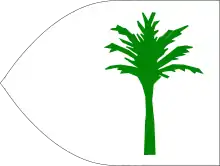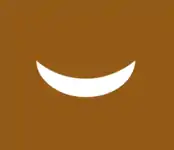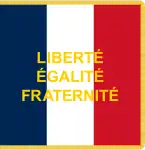 | |
| "Les trois barres" | |
| Use | National flag |
|---|---|
| Proportion | 2:3 |
| Adopted | 6 November 1959 |
| Design | A vertical tricolor of blue, gold, and red. |

The national flag of Chad (Arabic: علم تشاد, French: Drapeau du Tchad) is a vertical tricolour consisting (left to right) of a blue, a gold and a red field.[1] Since the 1990s, its similarity to the flag of Romania has caused international discussion. In 2004, Chad asked the United Nations to examine the issue; however, Ion Iliescu, the President of Romania, announced no change would occur to the flag, as the existence of Romania's tricolour predates the existence of Chad as a whole.
Description
The flag of Chad is a vertical tricolour consisting (left to right) of a blue, a gold and a red column. These were intended to be a combination of the colours of blue, white and red as seen on the flag of France with the Pan-African colours of green, yellow and red as seen on the flag of Ethiopia.[2] Furthermore, the blue represents the sky and hope; the gold is the sun and desert, and the red signifies the bloodshed over independence.[3]
The flag was adopted in 1959 for the autonomous republic and retained on independence in 1960, and in the constitution of 1962. Despite many political upheavals within Chad since independence, the flag has not been changed. This may be because the flag is not associated with any of the main power rivals within Chad, which had no sense of national identity before independence, and little after independence.[4]
Similarity with Romanian flag
The flag of Chad is almost identical to the national flag of Romania, although the colours in Chad flags may vary more than those specified for Romania. Romania has used the flag since 1866, which appeared for the first time in its current form in Wallachia. It was officially in use from 1848 until 1948, when it was superseded by the flag of the Socialist Republic of Romania. Chad began to use its present flag in 1960, after it achieved independence from France. When Chad adopted its flag, Romania's flag was different: it used to feature an insignia in the middle of the flag on top of the tricolour; this was added after World War II during the Communist era of the second half of the 20th century. However, in 1989 Romania's Communist government was overthrown and the insignia was removed, reverting Romania's flag to the prewar version which matched the one which had been adopted by Chad in the meantime.[5]
The crisis between Romania and Chad sharing similar flags has concerned the Chadian government on occasion; they requested in 2004 that the United Nations should consider it an issue. In response, Romanian President Ion Iliescu said to the media, "The tricolour belongs to us. We will not give up the tricolour."[5]
Historical flags


 Flag of Bornu (Kanem's successor) according to Gabriel de Vallseca (1439)
Flag of Bornu (Kanem's successor) according to Gabriel de Vallseca (1439) .svg.png.webp)


 Lapie's personal flag (1940–1942)
Lapie's personal flag (1940–1942)
 Standard of the French Community
Standard of the French Community
See also
References
- ↑ "Constitution of Chad" (PDF). presidence.td (in French). Chadian government. 31 March 1996. Retrieved 31 January 2017.
L'emblème national est le drapeau tricolore, bleu, or, rouge à bandes verticales et à dimensions égales, le bleu étant du côté de la hampe.
- ↑ MacDonald, Ian (20 November 2013). "Chad". Flags of the World. Retrieved 4 November 2016.
- ↑ Minahan, James (2010). The complete guide to national symbols and emblems. Santa Barbara, Calif.: Greenwood Press. p. 806. ISBN 978-0-313-34496-1. OCLC 436221284.
- ↑ Vagnat, Pascal (2000). Constitutions : what they tell us about national flags and coats of arms. Jos Poels. [Johannesburg, South Africa]: Southern African Vexillological Association (SAVA). ISBN 0-620-27350-X. OCLC 436864297.
- 1 2 "'Identical flag' causes flap in Romania". BBC News. 14 April 2004. Retrieved 4 November 2016.